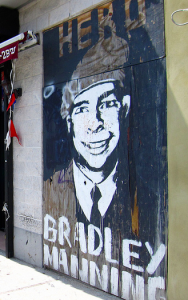Last week, US Army soldier and whistleblower Bradley Manning took the stand in a military hearing to explain, in his own words, why he leaked thousands of sensitive military documents to the website WikiLeaks. Journalist Alexa O’Brien’s unofficial transcript of the testimony is here. Manning told the court that he decided to leak these documents to the media because they left him deeply concerned about American military activities in the wars in Iraq and Afghanistan.
At the hearing, Manning’s defense team submitted a guilty plea for ten of the charges against him, including several minor charges related to accessing information. For those ten charges, Manning could face a maximum of 20 years in prison.
Despite his plea and testimony, the US government is continuing to pursue all 22 original charges against Manning. The most serious among them, ‘aiding the enemy,’ carries maximum penalties of life in prison or even the death penalty, though prosecutors have stated they will not ask for a death sentence in Manning’s case.
By testifying in court, Manning was able to confess to leaking documents to WikiLeaks and explain why he chose to do so. Manning described his horror and concern about American military activities he observed in his position as an Army Analyst. Commenting on a video that would later be known as Collateral Murder, which shows United States soldiers reveling in the shooting of two Reuters journalists and a number of unarmed civilians, Manning told the court:
“The most alarming aspect of the video to me, however, was the seemly delightful bloodlust they [the U.S. soldiers] appeared to have. They dehumanized the individuals they were engaging and seemed to not value human life by referring to them as quote “dead bastards” unquote and congratulating each other on the ability to kill in large numbers. At one point in the video there is an individual on the ground attempting to crawl to safety. The individual is seriously wounded. Instead of calling for medical attention to the location, one of the aerial weapons team crew members verbally asks for the wounded person to pick up a weapon so that he can have a reason to engage. For me, this seems similar to a child torturing ants with a magnifying glass.
Manning also described what he hoped to accomplish by releasing data about the wars in Iraq and Afghanistan – leaks that would come to be known as the Iraq War Logs and the Afghan War Diary:
I believe that if the general public, especially the American public, had access to the information…this could spark a domestic debate on the role of the military and our foreign policy in general as well as it related to Iraq and Afghanistan…I also believed the detailed analysis of the data over a long period of time by different sectors of society might cause society to reevaluate the need or even the desire to even to engage in counterterrorism and counterinsurgency operations that ignore the complex dynamics of the people living in the affected environment everyday.
Manning said he felt a “sense of relief” upon transferring information to WikiLeaks:
Although the information had not yet been published by the WLO, I felt this sense of relief by them having it. I felt I had accomplished something that allowed me to have a clear conscience based upon what I had seen and read about and knew were happening in both Iraq and Afghanistan everyday.
A three-time Nobel Peace Prize nominee, Manning has been imprisoned for nearly three years awaiting the beginning of his military trial. He has appeared in military court for various pre-trial hearings in which key components of his case and how it will be tried have been determined. These include facts about what witnesses will be permitted to testify, what evidence may be presented, and what arguments will be considered by the court.
A pivotal question in his case is whether or not United States's national security was harmed by WikiLeaks’ publication of the documents that Manning leaked. After a legal battle lasting several months, Manning's defense team was able to obtain government research reports on this question. However, the judge in Manning's case then ruled that whether national security was harmed by the leaks would not be considered a relevant factor in determining Manning’s guilt.
Unfortunately, officials have placed many limitations on public access to these hearings. The military refuses to provide an official transcript of the hearings to the public, and live coverage of the hearings (through Twitter or live blogging, for example) is prohibited. This is particularly troublesome because these proceedings, like military trials in general, are supposed to be accessible to the public.
Both the substance of Manning's case in particular, and the nature in which certain judicial proceedings around his case have been kept private, raise important questions about access to information and government transparency and accountability in the United States. These questions and the emerging role of Internet entities like WikiLeaks in providing open access to government documents are issues of significant concern for the Global Voices Advocacy community.
Manning is scheduled to begin his trial on June 3, 2013. Activist organizations worldwide are planning events to show support for Manning on June 1, 2013. Visit www.bradleymanning.org to learn more.





6 comments
How long will the global civilisation endure these evils. Governments elected by the people to promote the interests of the majority, using our heritage as their personal piggy banks.
He did this for the people and the system will punish him in such a way as to set the example for anybody else considering to follow his footsteps. It is in the public’s interest and it is your right to know.